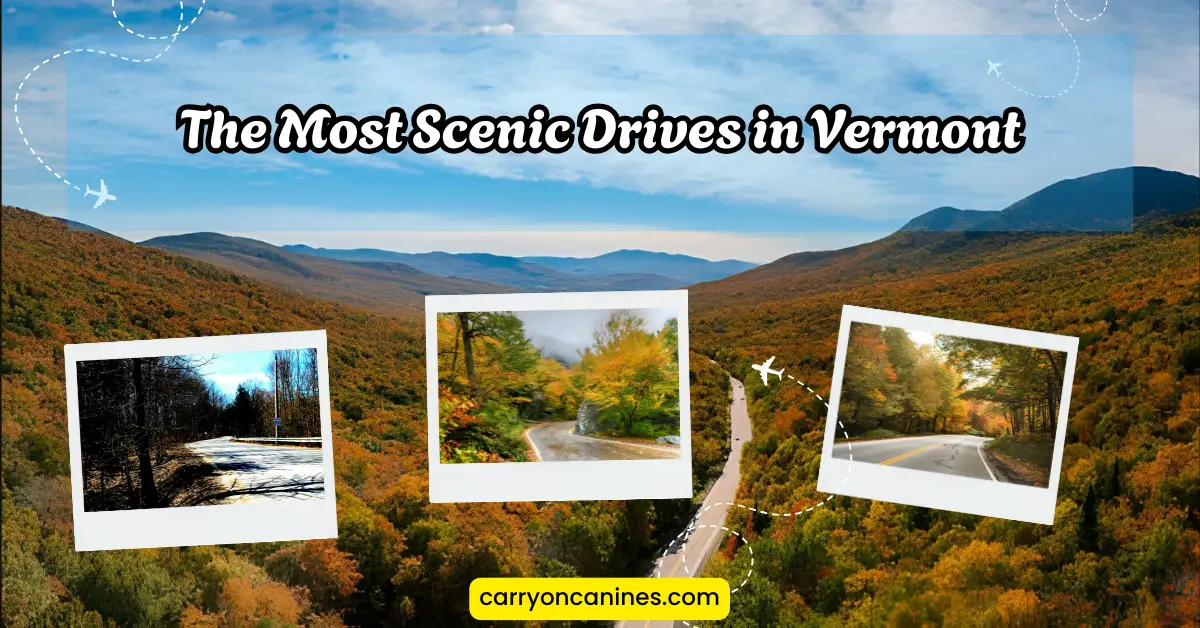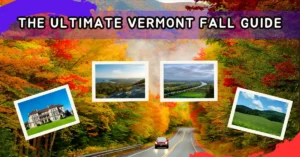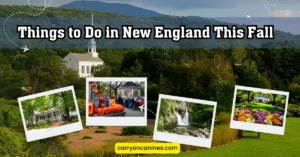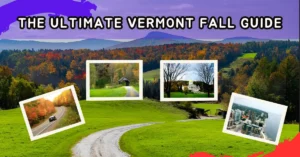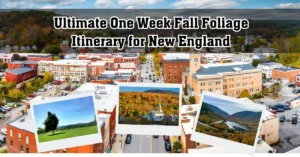There’s something unforgettable about driving through Vermont. The air smells like pine and wood smoke, the hills roll in waves of color, and every curve of the road feels like a painting come to life. Whether it’s the fiery reds of October, snow-dusted pines in winter, or the soft green glow of spring, Vermont’s landscapes never drive by unnoticed — they invite you to slow down.
Having explored the state for years, I’ve learned that Vermont’s most scenic drives aren’t just about mileage — they’re about mood. These roads connect historic towns, covered bridges, farms, waterfalls, and hidden lookouts where time stands still.
This guide to The Most Scenic Drives in Vermont blends firsthand experience, traveler insights, and detailed route data. It goes beyond the usual “top 10” lists to help you plan memorable stops, avoid crowds, and travel like a local.
Table of Contents
Toggle1. Route 100 – Vermont’s Backbone of Beauty
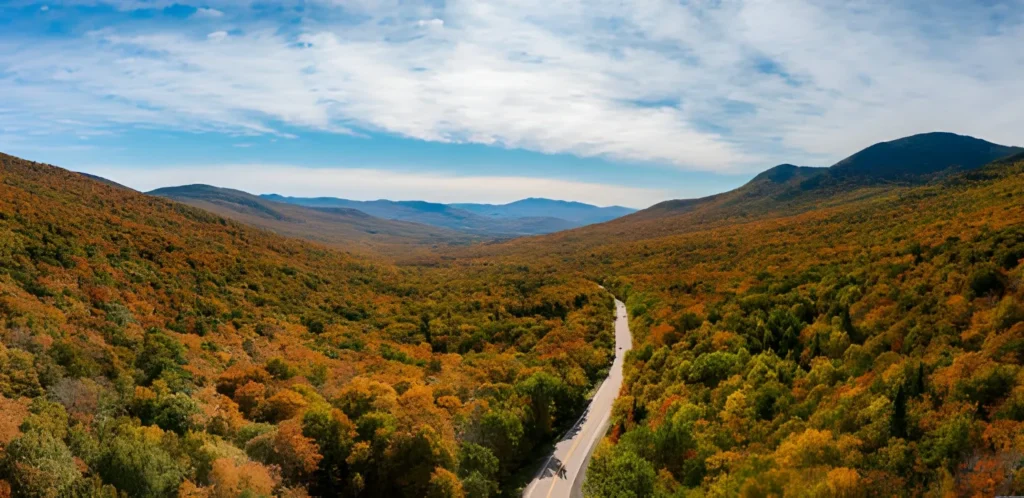
If Vermont had a signature road, Route 100 would be it. Stretching over 200 miles from Stamford in the south to Newport near the Canadian border, this drive slices through the heart of the Green Mountains and touches almost every postcard town in the state.
I’ve driven this route more than once in every season, but nothing compares to October. The air turns crisp, small towns come alive with fall festivals, and the hills glow like they’re lit from within.
Highlights Along Route 100:
• Wilmington – Start your journey here, surrounded by art galleries and lakeside cafés near Harriman Reservoir.
• Weston – Stop by The Vermont Country Store for maple fudge, flannel shirts, and the nostalgic charm of an old general store.
• Ludlow – Home to Okemo Mountain Resort — take a gondola ride for panoramic views of the southern peaks.
• Killington – Famous for ski slopes, but its scenic chairlifts in fall are equally stunning.
• Warren and Waitsfield – These twin towns in the Mad River Valley are classic Vermont — covered bridges, craft breweries, and farmers’ markets.
• Stowe – End your journey in this iconic mountain village, framed by Mount Mansfield, Vermont’s tallest peak.
Table – Route 100 Overview
| Section | Distance | Major Highlights | Best Season | Estimated Drive Time |
|---|---|---|---|---|
| Wilmington to Weston | 35 miles | Historic shops, Harriman Reservoir | Sept–Oct | 1.5 hrs |
| Weston to Killington | 40 miles | Scenic byway, covered bridges | All year | 1.5 hrs |
| Killington to Warren | 45 miles | Mountain vistas, ski resorts | Sept–Oct | 2 hrs |
| Warren to Stowe | 50 miles | Foliage, breweries, waterfalls | Sept–Nov | 2 hrs |
Traveler’s Tip:
Leave early in the morning when fog lingers over the valleys — the soft light turns even small ponds into mirrors. If you’re driving in fall, plan extra time for farm stands and photo stops; every bend brings something new.
2. The Scenic Route 7 – Southern Charm and Historic Beauty
Running north from the Massachusetts border to Burlington, Route 7 is often called the “Cultural Corridor of Vermont.” Unlike Route 100’s mountain drive, Route 7 flows through valleys and towns brimming with history, farms, and antique charm.
I’ve always loved this road for its balance — gentle hills, wide views, and plenty of local flavor along the way. It’s ideal for first-time visitors who want to experience Vermont’s beauty without steep climbs or narrow turns.
Highlights Along Route 7:
• Bennington – Start your trip with a visit to the Bennington Battle Monument and the old covered bridges just outside town. Don’t miss the Bennington Museum, which houses one of the largest Grandma Moses art collections.
• Manchester – Chic yet rustic. Enjoy outlet shopping, coffee at Mulligan’s on Main, or take a detour up Mount Equinox Skyline Drive, one of Vermont’s best mountain viewpoints accessible by car.
• Rutland – Known for its murals and local farmers’ market. Stop for lunch before continuing north.
• Middlebury – A college town with a mix of history and vibrancy. Visit the Otter Creek Falls or the UVM Morgan Horse Farm, one of the oldest in the country.
• Shelburne – A must-stop for the Shelburne Museum and Shelburne Farms, both offering lakeside scenery and agricultural heritage.
• Burlington – The Queen City. End your drive with sunset views over Lake Champlain and a stroll down Church Street Marketplace.
Table – Route 7 Highlights
| Town | Distance from Previous Stop | Notable Attractions | Best Season | Ideal Stop Duration |
|---|---|---|---|---|
| Bennington | – | Covered bridges, monument | All year | 2–3 hrs |
| Manchester | 25 miles | Shopping, Mount Equinox Drive | Sept–Nov | 3 hrs |
| Rutland | 40 miles | Art murals, farmers’ market | May–Oct | 2 hrs |
| Middlebury | 35 miles | Falls, horse farm | All year | 2 hrs |
| Shelburne | 25 miles | Museum, lakeside farm | June–Oct | 2 hrs |
| Burlington | 10 miles | Lake Champlain, Church Street | All year | 1–2 days |
Traveler’s Tip:
If you’re traveling in fall, drive northward so the sun stays behind you — the colors pop brighter through your windshield. Stop in Middlebury for locally made cheese or honey as a take-home souvenir.
3. Route 30 – The Road Less Traveled
If you’re looking for something quieter, Route 30 delivers. Winding through serene farmland, historic villages, and lakefront overlooks, it captures a softer, more meditative side of Vermont.
This route runs parallel to Route 7 for much of its length but passes through smaller towns and untouched scenery that most tourists miss. It’s one of my personal favorites for Sunday drives — peaceful, uncrowded, and dotted with hidden gems.
Highlights Along Route 30:
• Dorset – White marble sidewalks and classic Vermont architecture. Stop at the Dorset Quarry, a local swimming spot with crystal-clear water surrounded by cliffs.
• Poultney – A former slate town turned artsy community. Visit the small galleries and the historic East Poultney Green.
• Castleton – Known for its college-town friendliness and the nearby Lake Bomoseen State Park, perfect for picnics and kayaking.
• Sudbury and Cornwall – Quiet countryside dotted with barns and mountain views — ideal for photographers.
• Middlebury Gap Detour – A side trip east from Route 30 takes you through the Green Mountains to Ripton and Hancock — a must in October for peak foliage.
Table – Route 30 Key Stops
| Stop | Main Attraction | Scenic Value | Best Season | Notes |
|---|---|---|---|---|
| Dorset | Marble quarry, village charm | High | Summer–Fall | Great picnic spot |
| Poultney | Historic town green | Moderate | Summer–Fall | Artsy small-town vibe |
| Castleton | Lake Bomoseen State Park | High | May–Oct | Family-friendly |
| Sudbury | Countryside, photography | High | Sept–Oct | Off-the-beaten-path |
| Middlebury Gap | Mountain drive detour | Very High | Oct | Peak foliage route |
Traveler’s Tip:
Bring snacks and fill up on gas early — Route 30’s charm lies in its quiet stretches where convenience stores are few and far between.
4. Route 125 – The Middlebury Gap Scenic Drive
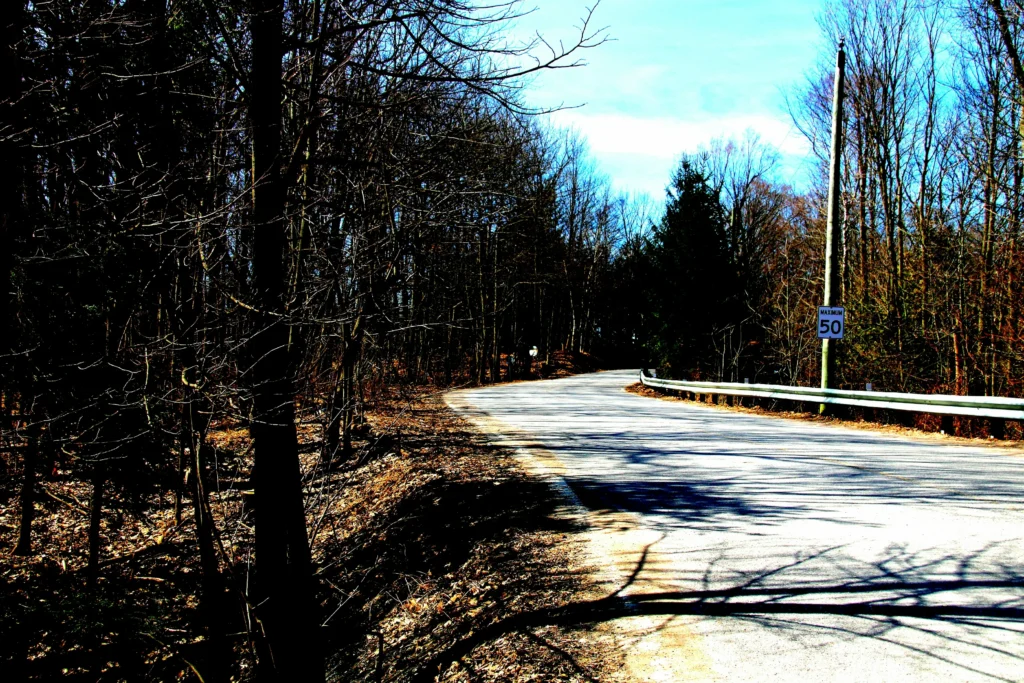
Few drives capture Vermont’s rugged mountain beauty like Route 125, better known as the Middlebury Gap Road. It cuts straight across the Green Mountains, linking the peaceful town of Middlebury in the west with Hancock and the rolling valleys of central Vermont.
When I first drove this route one October morning, fog hugged the treetops and sunlight streamed through maple leaves like stained glass. It’s a route that invites silence — every curve reveals a new layer of color and calm.
Route Highlights:
• Middlebury College Campus – A great starting point, especially in early fall when the campus lawns glow gold.
• Texas Falls Recreation Area – A short detour leads to one of Vermont’s most underrated waterfalls.
• Robert Frost Interpretive Trail – A peaceful, half-mile loop with poetry posts featuring Frost’s verses. Perfect for reflective travelers.
• Hancock Overlook – A must-stop for photographers; the valley views are pure Vermont magic.
Table – Route 125 Essentials
| Start | End | Distance | Drive Time | Top Stops | Best Month |
|---|---|---|---|---|---|
| Middlebury | Hancock | 16 miles | 40 mins | Texas Falls, Frost Trail, Hancock Overlook | Oct |
Traveler’s Tip:
If you’re visiting in early October, start in the west (Middlebury) during sunrise. The light filters through the trees and paints the road in amber. Stop in Hancock for a slice of fresh pie at a local diner — it’s the perfect way to end the drive.
5. Route 108 – Smugglers’ Notch Pass
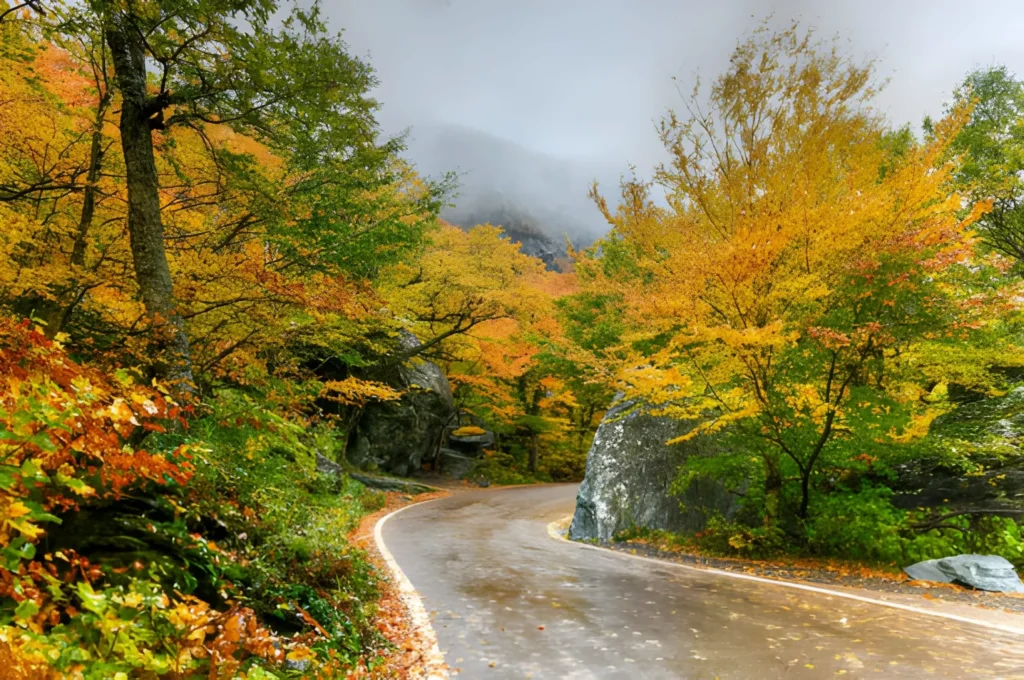
Route 108, or Smugglers’ Notch Pass, may be Vermont’s most dramatic road — both in beauty and history. Winding through the narrow passage between Mount Mansfield and Spruce Peak, this route once served as a smuggling corridor during the 19th century when trade restrictions pushed locals to sneak goods through its rocky corridors (hence the name).
Driving it today feels like entering another world. The road twists and dips beneath towering cliffs, ancient boulders, and dense forests that turn into a golden tunnel each fall.
Route Highlights:
• Stowe Village – A charming start with cafés, local craft shops, and trailheads nearby.
• Smugglers’ Notch State Park – The centerpiece of the drive, with boulders the size of cottages and caves to explore.
• Bingham Falls – A short, rewarding waterfall hike just off the roadside.
• Jeffersonville Village – End your journey here with a meal or local brew — it’s the perfect small-town finale.
Table – Route 108 Overview
| Section | Distance | Notable Sights | Road Conditions | Best Season |
|---|---|---|---|---|
| Stowe to Smugglers’ Notch | 9 miles | Rock formations, waterfalls | Narrow, steep | Sept–Oct |
| Smugglers’ Notch to Jeffersonville | 7 miles | Mountain cliffs, scenic forest | Curvy but scenic | Sept–Oct |
Traveler’s Note:
The Notch closes in winter due to heavy snow and icy conditions (usually from late October to May). If you plan to drive it, check the Vermont 511 road closure site before departure.
Local Tip:
Pull over near the trailhead of Bingham Falls or the picnic area inside the Notch. The sound of rushing water and rustling leaves makes this one of the most peaceful places in Vermont.
6. Route 17 – The Appalachian Gap
Route 17, known as the Appalachian Gap Road or App Gap, is for those who crave a more thrilling drive. It snakes through Vermont’s northern mountains with sharp turns, steep climbs, and jaw-dropping views of the Champlain Valley.
I still remember pulling over at the top of the Gap — mist rolling between the peaks, the valley glowing gold beneath. It’s the kind of view that quiets even the most talkative road-trippers.
Route Highlights:
• Bristol Village – A lively start filled with coffee shops and general stores.
• Mad River Glen Ski Area – A classic Vermont ski slope, but in autumn it turns into a peaceful overlook.
• Appalachian Gap Overlook – One of the highest points reachable by car in the state.
• Waitsfield and Warren – End the journey with craft beer at Lawson’s Finest Liquids or local cheese at the Warren Store.
Table – Route 17 Quick Facts
| Start | End | Distance | Drive Time | Elevation Gain | Top Viewpoint |
|---|---|---|---|---|---|
| Bristol | Waitsfield | 24 miles | 50 mins | 2,365 ft | App Gap Overlook |
Traveler’s Tip:
Go slow — the switchbacks are sharp. Bring binoculars if you’re visiting in September; you’ll spot hawks migrating south across the ridge.
Why It’s Worth It:
This route offers the most cinematic elevation change in Vermont — a balance of adrenaline and serenity. Every bend feels earned, every view unforgettable.
7. Scenic Drive Comparison – Which One Is Right for You?
| Route | Length | Terrain | Best Season | Level of Traffic | Experience Type |
|---|---|---|---|---|---|
| Route 100 | 200+ miles | Mountain valleys | Sept–Nov | Moderate | Iconic, varied towns |
| Route 7 | 180 miles | Historic valley route | May–Oct | Moderate | Culture & lakes |
| Route 30 | 100 miles | Farmland & backroads | June–Oct | Light | Quiet, pastoral beauty |
| Route 125 | 16 miles | Mountain pass | Sept–Oct | Light | Poetic, reflective |
| Route 108 | 16 miles | Narrow mountain gap | Sept–Oct | Heavy (seasonal) | Dramatic & adventurous |
| Route 17 | 24 miles | High-altitude drive | Sept–Oct | Light–moderate | Thrilling, panoramic |
Traveler Insight:
If you’re looking for a laid-back full-day trip, Route 7 or Route 100 will give you variety. If you crave mountain drama, go for Route 108 or 17. For quiet countryside and no crowds, Route 30 and 125 are unmatched.
8. Best Time to Drive Vermont’s Scenic Routes
Vermont transforms with every season, but for scenic drives, timing matters more than mileage.
8.1 Fall – The Iconic Season
If there’s one time to visit, it’s late September to mid-October. This is when the Green Mountains blaze in shades of crimson, amber, and gold. Popular routes like Route 100 and Route 108 see the most travelers, but early mornings and weekdays stay peaceful.
• Peak foliage: October 1–15 (central Vermont peaks first).
• Best lighting for photography: 7 a.m. – 9 a.m. and 4 p.m. – 6 p.m.
• Essential gear: light layers, rain shell, camera polarizer, thermos for cider.
8.2 Summer – Lush Green and Waterfalls
From June through August, waterfalls swell, swimming holes shimmer, and roads like Route 30 and Route 125 feel alive with summer markets. Pack a picnic and dip your feet in Lake Bomoseen or Texas Falls.
8.3 Winter – Quiet Magic
While some mountain passes (like Smugglers’ Notch) close for snow, routes 7 and 100 remain open. Expect covered bridges frosted with snow and cozy lodges glowing in every valley.
8.4 Spring – The Secret Season
Late April to May is “mud season,” yet it’s perfect for solitude seekers. Maple sugaring is in full swing, and Route 7’s farmlands glisten with new growth.
Traveler’s Tip:
Download Vermont’s 511 Traveler Information App before your trip. It tracks live closures, construction, and weather — a must if you’re driving mountain roads.
9. 5-Day Vermont Scenic Drive Itinerary
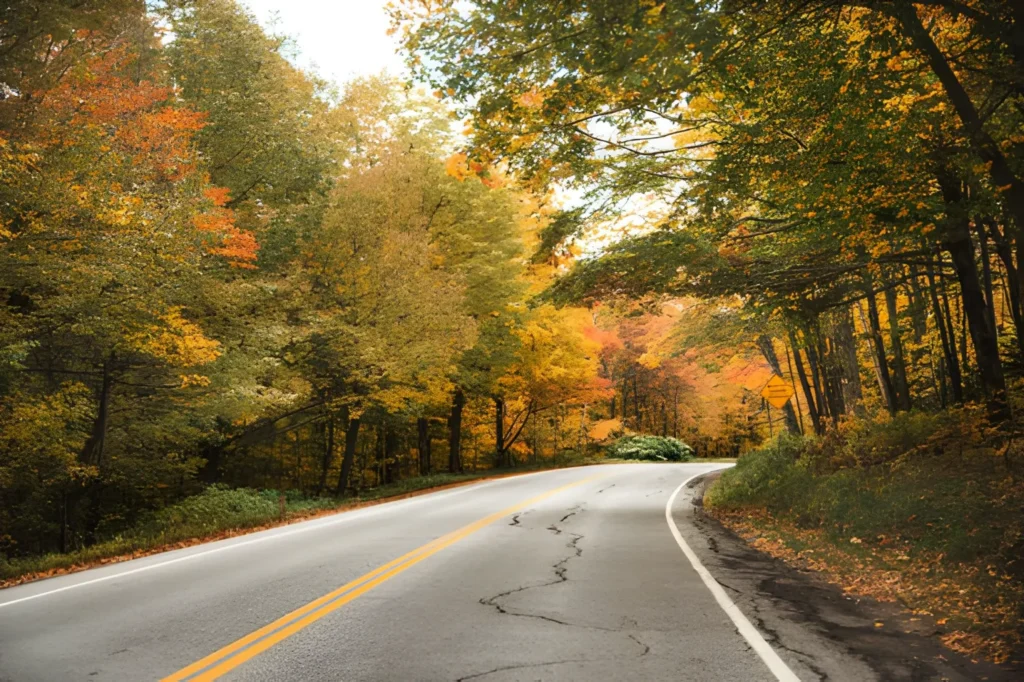
This sample itinerary ties the best drives into one seamless adventure, combining iconic highways, local flavor, and overnight stays in charming towns.
Day 1 – Bennington → Manchester → Ludlow (Route 7 & Route 30)
• Start in Bennington; climb the Battle Monument for a 360-degree view.
• Stop at The Vermont Country Store in Weston.
• Overnight in Ludlow near Okemo Mountain Resort.
Day 2 – Ludlow → Killington → Warren → Stowe (Route 100)
• Follow Route 100 North, the backbone of Vermont.
• Pause at Moss Glen Falls near Granville.
• Evening stroll through Stowe Village; stay at a cozy inn or the Trapp Family Lodge.
Day 3 – Stowe → Smugglers’ Notch → Jeffersonville → Burlington (Route 108)
• Drive early through Smugglers’ Notch Pass before crowds.
• Lunch in Jeffersonville at a local brewpub.
• Arrive in Burlington for lakefront dining and sunset on Lake Champlain.
Day 4 – Burlington → Middlebury → Hancock (Route 7 & 125)
• Visit Shelburne Farms, then continue south.
• Drive the Middlebury Gap Road (Route 125) for waterfalls and mountain views.
• Overnight in Hancock or Rochester; quiet inns and farm stays abound.
Day 5 – Hancock → Brandon → Poultney → Manchester (Route 30 Loop)
• Follow Route 30 South through farm country.
• Picnic at Lake Bomoseen State Park.
• End your trip back in Manchester with dinner at The Silver Fork — a fitting finale to a week on the road.
Table – 5-Day Scenic Drive Overview
| Day | Primary Routes | Distance | Highlights | Overnight Stop |
|---|---|---|---|---|
| 1 | 7 & 30 | 80 mi | Bennington, Weston, Ludlow | Ludlow |
| 2 | 100 | 90 mi | Killington, Warren, Stowe | Stowe |
| 3 | 108 | 45 mi | Smugglers’ Notch, Lake Champlain | Burlington |
| 4 | 7 & 125 | 70 mi | Shelburne, Middlebury Gap | Hancock |
| 5 | 30 | 85 mi | Lake Bomoseen, Dorset | Manchester |
Traveler Insight:
Average driving time per day ranges from 3–5 hours. Add an hour for photography stops — you’ll want to pull over often.
10. Practical Driving and Photography Tips
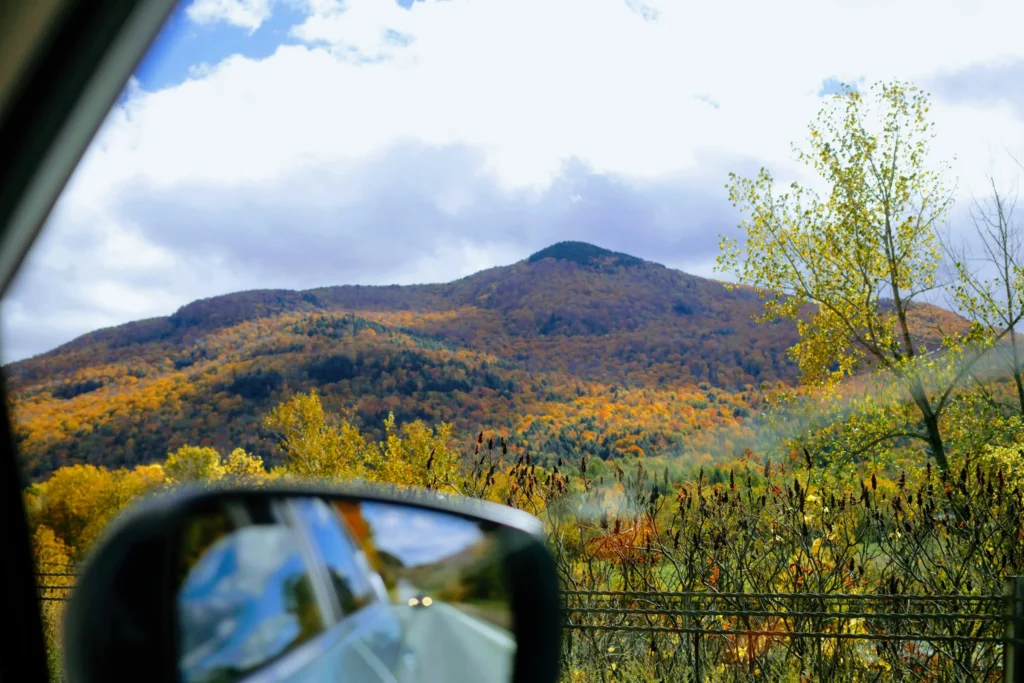
• Fuel early: Gas stations thin out in rural stretches, especially on Route 30.
• Watch for wildlife: Dawn and dusk are active times for deer and moose.
• Bring cash: Some farm stands and small cafés don’t accept cards.
• Pack layers: Weather can swing 20 °F between valleys and summits.
• Photography tip: After rainfall, colors deepen; use reflections from ponds or wet roads for cinematic shots.
11. Where to Stay on Scenic Drives
| Region | Recommended Stay | Style | Price Range |
|---|---|---|---|
| Bennington – Manchester | The Equinox Resort | Historic luxury | $$$ |
| Ludlow – Killington | Echo Lake Inn | Country classic | $$ |
| Stowe | Trapp Family Lodge | Alpine-inspired | $$$ |
| Burlington | Hotel Vermont | Modern boutique | $$$ |
| Middlebury – Hancock | Swift House Inn | Cozy B&B | $$ |
Traveler’s Tip:
Book two nights in Stowe or Burlington — they offer the best combination of dining, culture, and nature.
12. Final Thoughts on Most Scenic Drives in Vermont
Every curve in Vermont tells a story — a barn reflected in a quiet pond, a family farm selling cider from the porch, a ridge glowing orange at sunset. Driving here isn’t just about reaching a destination; it’s about the rhythm of the road itself.
Whether you’re exploring winding backroads like Route 30 or conquering mountain passes like Route 108, the real reward lies in slowing down. Pull over. Breathe the air. Watch the light change across the hills.
When you leave Vermont, you’ll carry the color of its trees in your memory — a reminder that beauty lives best when it’s unhurried.

